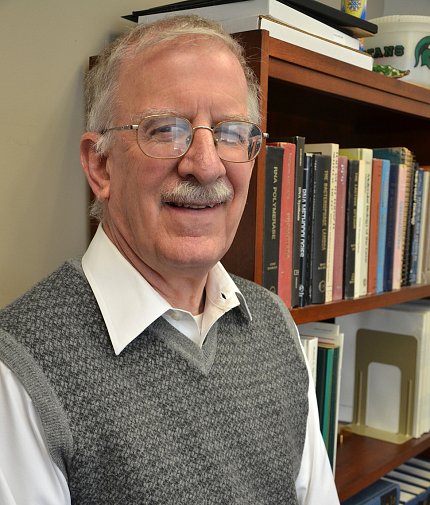Revzin Retires from CSR

In an earlier stage in his career, Dr. Arnold Revzin pioneered the gel shift assay, a widely used method to determine if protein binds to a given DNA/RNA sequence. He transferred the creativity and perseverance that marked his research to the Center for Scientific Review, where he retired recently as chief of an oncology integrated review group.
Revzin’s ability to “roll up his sleeves and get to work” distinguished him as an outstanding scientist, administrator and NIH colleague, said Dr. Donald Schneider, senior advisor to the CSR director and former director of CSR’s Division of Basic and Integrative Biological Sciences. “We were lucky to have Arnold as a colleague. He has been a constructive force with substantial presence at NIH.”
Revzin grew up in Chicago and majored in chemical engineering at the University of Michigan. “I gravitated to the ‘chemical,’ not the ‘engineering’ side,” he said. He went on to the University of Wisconsin, where he received his Ph.D. in physical chemistry. He then conducted postdoctoral research at the Weizmann Institute, Max Planck Institute and University of Oregon.
He joined the Michigan State University faculty in 1975 and is now professor emeritus. In 1981, his co-authored article introducing the gel shift assay garnered some 900 citations; he has also published numerous other articles, monographs and chapters.
In 1984, a 1-year rotation appointment as a program director at the National Science Foundation proved pivotal in two ways. First, when he returned to MSU, he went into administration, becoming associate dean in the College of Natural Science and assistant vice president for research services. Second, he found he enjoyed working in a federal science agency.
When his wife took a position at the National Archives in Washington, Revzin sought a position at NIH. He joined CSR in 1998 as a scientific review officer for three biophysical chemistry study sections. He also worked as a referral officer to assign grant applications to study sections for peer review. In 2013, he became chief of the oncology 1-basic translational IRG.
Revzin took on other assignments while at CSR, including chairing committees on training and on scientific overlap to respond to appeals by grant applicants. He also enjoyed outreach opportunities, explaining the review process to postdocs and early stage investigators at scientific meetings.
“Arnold is the ultimate professional,” said Dr. Noni Byrnes, current director of the Division of Basic and Integrative Biological Sciences. “He is easygoing, with a tremendous sense of integrity.” Schneider said he appreciated Revzin’s “ability to blend a blunt honesty with a wonderful sense of humor.”
Looking back, Revzin enjoyed each aspect of his career. “I liked being a faculty member and administration was interesting because I wanted to see how the university worked,” he said. “When I came to NIH, I found I enjoyed contributing to science in a different, broader way.”
Revzin will continue to “roll up his sleeves” in retirement. He volunteers at an addiction treatment center associated with Suburban Hospital. By taking on some of the center’s administrative and front-desk tasks, he frees up the professionals to focus on patient care. He also plays the recorder with a group of fellow musicians, mostly classical and occasionally ragtime and other genres of music. He also appreciates having more time to travel and to visit family members, including two grandchildren in Houston.
